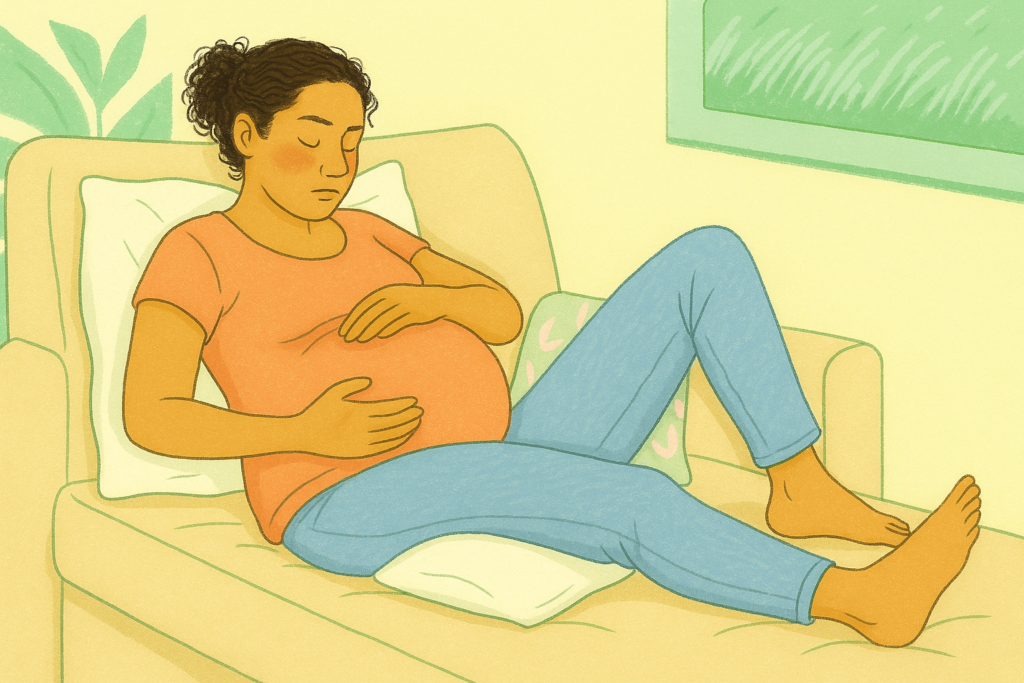During pregnancy, comfort can feel elusive. Shifting from side to side or adjusting pillows often provides only temporary relief, leaving many expectant mothers in a constant search for a supportive position.
All this shifting and fidgeting isn’t just normal, it’s your body’s way of nudging you: “Hey, move a little, I’ll feel better.” Those aches in your hips, the twinge in your lower back, even the stiffness after sitting too long; they’re all part of the grand adjustment your body is making to grow and carry your baby.
In this blog, we’ll explore why these pains happen, how often to move, and what really helps. You will also find helpful insights from Dr. Charles M. Carlsen, a Board-Certified Obstetrician-Gynecologist and Co-founder of Drsono.
Why does pregnancy cause pain?
Pregnancy is a full-body transformation, and with all the amazing changes happening inside you, it’s no wonder a few aches and twinges tag along. What really goes on is…
Weight distribution
As your uterus grows, your center of gravity shifts, altering the body’s weight distribution and naturally pulling the torso out of alignment. It causes wobbly balance and extra strain on your back.
Hormonal effects
The hormone relaxin loosens ligaments to prepare your body for birth. But, it can leave your joints feeling a little less steady.
Circulation changes
More blood is pumping through your system to nourish your baby, which sometimes shows up as swelling, tingling, or numbness.
Nerve pressure
Your expanding uterus can press on nerves, especially the sciatic nerve creating those sharp “zing!” pains in your lower back or legs.
To put it simply, your body is working overtime. Staying in one position for too long whether sitting, standing, or lying down can make the body feel tighter and more uncomfortable.
Moving gently and frequently helps relieve that pressure. We’ll get to just how often in a while.
What are normal pregnancy aches? (Nothing to fear)
Pregnancy changes so much about your body, and with that comes a whole mix of new sensations. Many of these aches are just your body’s way of stretching, shifting, and preparing for the incredible work it’s doing.
Here are a few you might notice and why they’re usually nothing to be afraid of:
Backaches and hip pain
As your belly grows, your posture shifts, and the weight pulls more on your lower back and hips. It’s uncomfortable, yes, but very common.
What can help: Pillows, gentle stretches, and frequent position changes.
Round ligament pain
Those sharp, sudden twinges in your lower belly (often when you stand up quickly or roll over in bed) are usually just the ligaments stretching to support your growing uterus. They can feel startling, but they’re harmless.
What can help: Gentle stretches, slow position changes, and supportive belly bands can ease round ligament pain
Pelvic pressure
Later in pregnancy, your baby begins to settle lower, and that heaviness in your pelvis is a normal part of the journey.
What can help: Taking breaks, using a support belt, or lying on your side.
Leg cramps
If you are waking up with a charley horse in the middle of the night, it’s because circulation changes. And, added weight often causes cramps.
What can help: Gentle stretching before bed
Mild swelling in feet and ankles
A little puffiness is common, especially at the end of the day.
What can help: Resting with your feet up or soaking in cool water
General stiffness
Sitting or lying in one position for too long makes anyone ache, but during pregnancy, it shows up even quicker. Shifting and moving every so often helps your muscles and joints feel more at ease.
What can help: Light stretching, and short walks can reduce stiffness and improve comfort
All of these are part of the story of pregnancy. They may not always feel pleasant, but they’re usually signs that your body is doing exactly what it’s meant to do. As Dr. Charles explains, “Pain is sometimes an answer to normal shifts, like ligaments stretching and blood volume expanding.”
How to reduce pain? How often to change position for pregnant women to reduce pain?
There’s no strict timer that every pregnant woman has to follow, but experts agree on one thing: regular little shifts make a big difference. Think of it as giving your body a gentle reset throughout the day.
Every 30–60 minutes
Try to change things up – stand, stretch, or take a short walk. Even a quick wiggle in your chair counts. As Dr. Charles notes, “Two minutes does help. I have seen women feel dramatically better adopting just that small habit.”
During sleep
Pillows are your best friend. When you sleep, tuck one under your belly, another between your knees, and if you wake up stiff, simply roll to the other side.
When sitting for work or travel
Dr. Charles highlights, “Prolonged sitting makes blood circulate slowly in the legs, also increasing the risk of swelling or even blood clot. I recommend: use a timer, stand up, stretch, or take a short walk. Two minutes does help. I have seen women feel dramatically better adopting just that small habit.”
So, set a reminder if you need to – stand, walk, or stretch “at least once an hour” to give your back and hips some relief.
The key isn’t moving perfectly, it’s moving often. Small adjustments add up to more comfort, better circulation, and less of that “stuck in place” feeling.
Practical tips for feeling better
Those little aches don’t have to rule your day. Here are a few simple things that can make a big difference. As Dr. Charles reminds us, “Small adjustments soothe giant worries.”
Get cozy with pillows
A body pillow or a wedge tucked under your belly or between your knees can feel like a game-changer for tired hips and backs.
Keep it gentle
A short walk, a dip in the pool, or some calming prenatal yoga stretches can melt away stiffness without overdoing it.
Change positions
Avoid sitting or standing for a long period of time. Dr. Charles reiterates, “Resting by itself normally makes stiffness worse. Movement keeps the muscles in balance and alleviates backache. Stretching of the lower back and hips alleviates tension from the spine.”
Don’t wait for the ache
Try shifting before the discomfort really sets in – a slight change of position can go a long way.
Listen to your body
Your body is speaking up for both you and your baby. If a position feels off, switch it up. Comfort is a cue worth following.
Think of these as little love notes to yourself to stay comfortable while your body works its incredible magic.
When to talk to your doctor?
Most of the time, pregnancy aches are just your body stretching and adjusting. But every now and then, pain can be a sign to check in. Call your doctor if you notice:
- Severe or sudden abdominal pain that feels different from the usual twinges.
- Pain paired with bleeding, contractions, or fluid leakage.
- Discomfort that doesn’t ease up even after you’ve rested, shifted, or tried to get comfortable.
Trust your instincts – if something doesn’t feel right, it’s always worth making the call. Your provider is there to reassure you and keep both you and your baby safe.
Conclusion
Pregnancy comes with its fair share of wiggles, shifts, and middle-of-the-night pillow rearrangements. While the aches can sometimes feel overwhelming, remember, they’re usually just signs of your body stretching, softening, and preparing for the incredible journey of birth.
If something feels off, your provider is only a call away, not just for medical advice, but also for peace of mind. You’re doing beautifully, and every little shift you make is one more step in caring for both you and your baby.
FAQs
Q: 1. How often should I move during the day?
A: Most experts suggest shifting, stretching, or standing up every 30 – 60 minutes, especially if you’re sitting at work or traveling.
Q: 2. Is back and hip pain normal during pregnancy?
A: Yes. It’s one of the most common pregnancy discomforts caused by weight shifts and relaxed ligaments. Pillows and gentle activity can help.
Q: 3. Why do I feel pain mostly at night?
A: Lying in one position for hours can make joints and muscles stiff. Pillows and frequent side-to-side shifts can help.
Q: 4. Why do my legs cramp so much?
A: Circulation changes, extra weight, and pressure on nerves all contribute. Staying hydrated, stretching before bed, and moving during the day can reduce cramps.
Q: 5. Do I really need special pregnancy pillows?
A: Not necessarily. A body pillow or even a few regular pillows arranged around you can provide just as much support.
Q: 6. Can sitting too much make pain worse?
A: Yes, sitting for long stretches can add to back, hip, and leg discomfort. Try standing, stretching, or walking every 30 – 60 minutes.
Q: 7. What’s the difference between normal pain and something serious?
A: Normal pains are usually mild, come and go, and improve with rest or movement. Serious pains are sudden, severe, or paired with bleeding, contractions, or fluid leakage – those always call for a check-in with your provider.
Sources:
- Pregnancy Pains. National Library of Medicine. “Aches and pains during pregnancy”
- Round ligament pain. NHS.UK. “Round ligament pain in pregnancy”
- Physical movement. NHS.UK. “Back and pelvic pain in pregnancy”
- Movement during pregnancy. NHS.UK. “Movement throughout your pregnancy for health and wellbeing”


